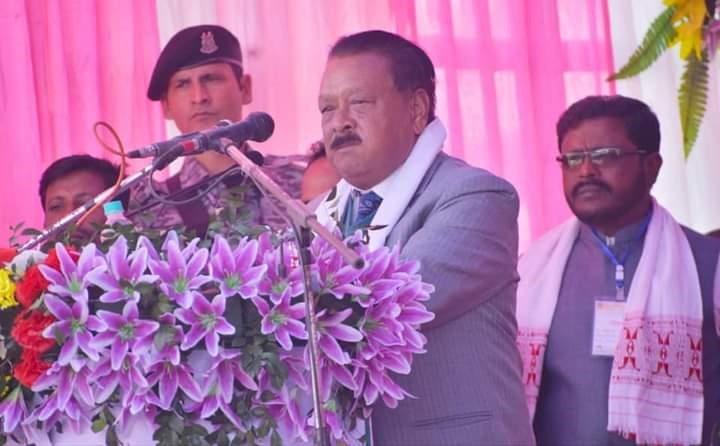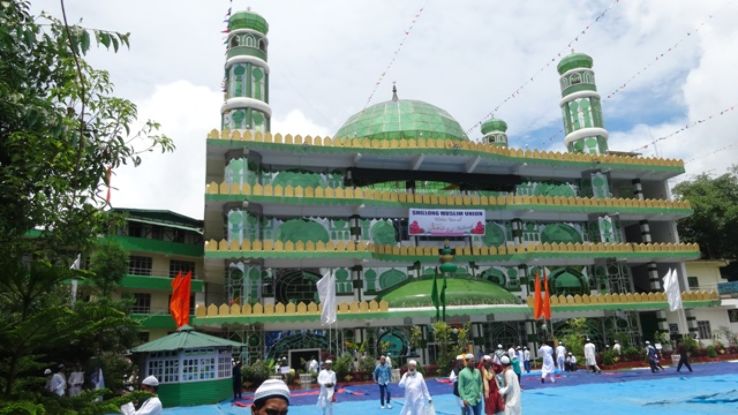
Jhumur Deb/Shillong

Syedullah Nongrum belongs to one of the oldest Khasi-Muslim families in Meghalaya. His parents, the Late Subartan Bibi Nongrum and Late S.K. Abdullah, raised him in a home where tribal traditions blended seamlessly with Islamic faith.
“It is possible to be both Khasi and Muslim without contradiction,” Nongrum says firmly. “Our culture is rooted in the land, and our faith teaches us to respect all.”
The Shillong Muslim Union, founded in 1905, is older than the All India Muslim League. It was created at a time when Muslims in Shillong were few but determined to assert their presence through education and social work. SMU’s historical prestige was affirmed when Fakhruddin Ali Ahmed, who would go on to become India’s fifth President, served as its first president in 1964.
_with_top_officials_of_the_govt.jpg) Syedullah Nongrum (In the center) with former Governor of Maghalaya R N Ravi (second from left) and others
Syedullah Nongrum (In the center) with former Governor of Maghalaya R N Ravi (second from left) and others
Nongrum recalls his early days with SMU: “I was still a student when I began assisting in its activities. Fakhruddin Ali Ahmed spoke to me at length about community welfare. That conversation shaped my life.”
By the time he took over as General Secretary in 1982, SMU was struggling. Its properties had been encroached upon or fallen into disrepair. The guest house and orphanage were dilapidated; the Idgah ground, an important religious space, had become a symbol of neglect.
Nongrum took charge with quiet determination. Under his leadership, the SMU underwent a transformation that has few parallels in Northeast India. The most visible sign of this revival is the Madina Masjid, a stunning mosque in downtown Shillong—now the largest in the entire Northeast. But more than a spiritual center, it houses an Islamic learning center for religious education, a school for underprivileged children, and a modern college offering science, arts, and technology courses.
_in_front_of_historic_Glass_Mosque.jpg) Syedullah Nongrum (extreme right in sitting row) in front of the historic Glass Mosque
Syedullah Nongrum (extreme right in sitting row) in front of the historic Glass Mosque
His vision was simple yet radical: “Religious institutions must serve society, not just one group, but everyone.”
Ongrum’s work didn’t stop at the SMU’s gates. In 1993, he made history by becoming the first and only Khasi Muslim to be elected to the Meghalaya Legislative Assembly, representing the Rajabala constituency in West Garo Hills, a Muslim-majority area.
He served as a cabinet minister and used his position to advocate for minority rights, tribal welfare, and better educational access.
Among his proudest achievements is the establishment of Umshyrpi College in Shillong, which now educates over 3,500 students from diverse socio-economic backgrounds. “Education must break barriers,” he says. “It should not be limited by caste, religion, or tribe.”
The college offers subsidized fees, vocational training, and encourages interfaith activities—a reflection of Nongrum’s inclusive worldview.

Glass Mosque of Shillong
Promoting Communal Harmony in a Sensitive Region:
Meghalaya, like other parts of Northeast India, has seen its share of communal tension, often exacerbated by migration and identity-based politics. In such an environment, Nongrum’s approach to leadership has been one of dialogue and peace-building.
He is a founder member of the Shillong All Faith Forum, an inter-religious collective comprising Christian, Muslim, Hindu, Sikh, Buddhist, and indigenous spiritual leaders. The forum has played a key role in calming tensions during communal flashpoints and advocating for policies that uphold the state’s pluralistic values.
"We are guardians of this land’s peace,” Nongrum says. “Religion should never be a source of division.”
His insistence on dialogue and reconciliation has earned him quiet respect, even from ideological opponents. “He doesn’t just talk about unity—he lives it,” says Rev. Wansuk Thabah, a Presbyterian leader who has worked with Nongrum on various All Faith Forum campaigns.
Upholding Khasi Identity with Islamic Values:
One of the most striking aspects of Nongrum’s life is how he has navigated dual identities—remaining a practicing Muslim while deeply committed to Khasi traditions, including the matrilineal system that defines Khasi social structure.
“I take my mother’s clan name. My children take their mother’s clan name. That is how it has always been,” he says. “Islam teaches me to respect my mother, and Khasi culture tells me to honour the lineage of women. I do both.”
_while_inaugurating_an_education_project.jpg) Syedullah Nongrum (second from right) inaugurating an education project
Syedullah Nongrum (second from right) inaugurating an education project
In his personal and public life, Nongrum reflects a rare balance. His Friday sermons may begin with Quranic verses, but they often end with appeals for environmental protection, girls' education, or peace in the neighborhood.
A Legacy of Quiet Leadership:
Now in his 70s, Syedullah Nongrum shows no signs of slowing down. He continues to attend SMU meetings, oversee educational programs, and speak at interfaith forums. But he remains modest about his achievements.
“This is not about me,” he says with a soft smile. “It’s about making sure that Khasi Muslims—and indeed all communities—find a dignified space in Meghalaya’s future.”
ALSO READ: Assam's fishery king Nazrul Haque changed flood calamity into livelihood opportunity
In an age of polarisation and hardening identities, Syedullah Nongrum’s life offers a different narrative: one of inclusion, rootedness, and quiet strength. He is not just a bridge between the Khasi and Muslim worlds—he is a builder of pathways where none seemed possible.
